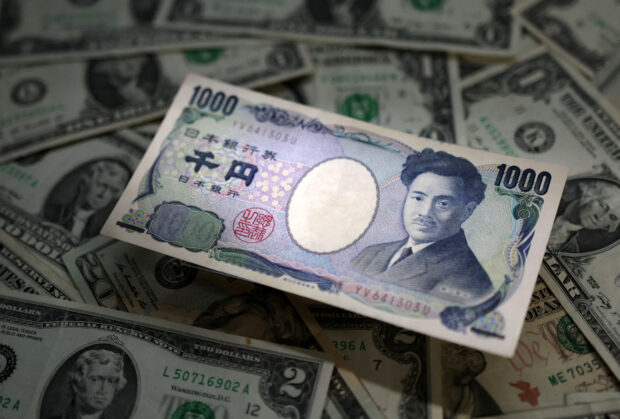
Japanese Yen and U.S. dollar banknotes are seen in this illustration taken March 10, 2023. REUTERS/Dado Ruvic/Illustration/File photo
TOKYO – The yen firmed against the dollar on Monday as signs the Bank of Japan will exit negative interest rates at its policy meeting next week contrasted with expectations that the Federal Reserve will cut rates in June.
The dollar index, which measures the currency against the yen and five other major rivals, stuck close to a nearly two-month low reached on Friday, when monthly payrolls figures signaled a cooling U.S. labor market, keeping the Fed on track to ease policy.
The greenback eased 0.06 percent to 146.995 yen, and earlier dipped as low as 146.54, bringing it to the cusp of Friday’s five-week low of 146.48.
The dollar index was 0.06 percent higher at 102.74, hovering not far from Friday’s low of 102.33, a level not seen since Jan. 15.
Dollar-yen “should remain heavy this week, with bounces into 148 likely to attract sales as expectations continue building that the BOJ might tweak policy (on) 19th March,” Westpac strategists wrote in a note to clients.
Meanwhile, the dollar index “looks vulnerable to a deeper setback,” and could test support at 101 this week, the note said.
READ: BOJ to scrap negative interest rates in April, say over 80% of economists
A growing number of BOJ policymakers are warming to the idea of ending negative rates at their March 18-19 meeting, sources told Reuters, amid expectations for hefty pay rises from Japan’s biggest firms that could boost soft consumer spending. Results of this year’s annual shunto wage negotiations are due on Wednesday.
Elsewhere, Jiji news agency reported the BOJ is considering a new quantitative monetary policy framework to replace the current yield curve controls.
Technical recession avoided
At the same time, an upward revision to Japan’s economic growth last quarter meant the country avoided a technical recession, adding to the argument the economy could weather tighter policy.
READ: Japan Q4 GDP revised up to slight expansion, economy avoids recession
By contrast, traders lay odds at 73 percent for the Fed to cut rates by the conclusion of its June 11-12 meeting, according to the CME Group’s FedWatch Tool, as softness in Friday’s jobs data reinforced Fed Chair Jerome Powell’s comments earlier in the week that policymakers were “not far” from having the confidence needed to cut rates.
Tuesday’s U.S. consumer price data will be the next test of market pricing, ahead of the next Fed meeting on March 19-20.
Following “dovish-tilting signals” from the jobs report, “price action in the dollar continues to be two-way, but clearly lacking an upside impetus now with markets looking ahead to Fed rate cuts and U.S. exceptionalism starting to weaken,” Saxo Markets analysts wrote in a research note.
The euro was little changed at $1.0937 after jumping as high as $1.0980 on Friday for the first time since Jan. 12. The European Central Bank left rates at record highs last Thursday while cautiously laying the ground to lower them later this year.
Sterling was little changed at $1.2850, after pushing to the highest since late July at $1.2890 on Friday amid bets the Bank of England will be slower to cut rates than the Fed or ECB. The British currency faces a test on Tuesday with the release of labour market data.
In cryptocurrencies, bitcoin was last up 0.3 percent at $68,625, as it continued to track mostly sideways since reaching a record peak of $70,175 on Friday.